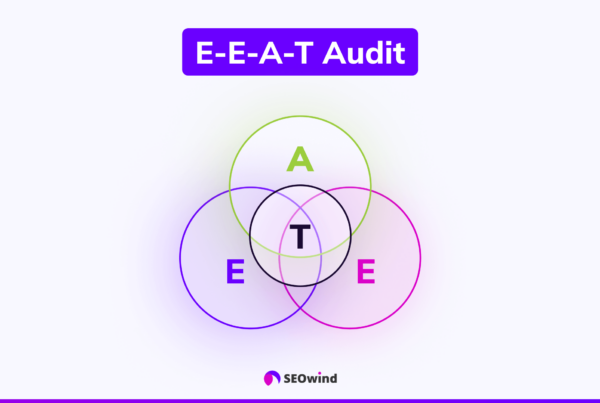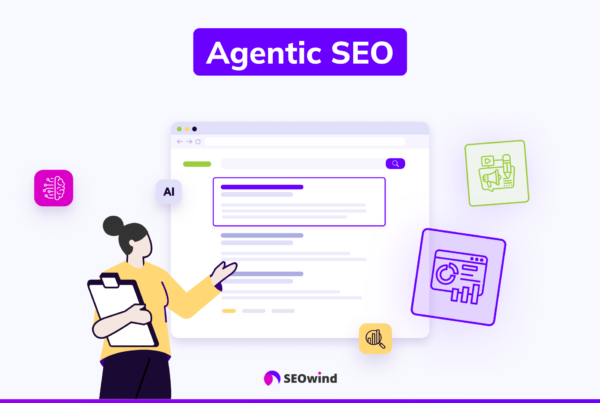Recently, automated content creation assistants have gained substantial traction among marketers. The potential is intriguing. If effective, these solutions can save time without sacrificing quality, whether they simply produce content briefs, content outlines, or create the content themselves. Among these, ChatGPT is a particularly popular option that has proven highly impactful on SEO.
However, this tool is not flawless and does not fit every situation. Knowing ChatGPT’s strengths and weaknesses is essential to making effective use of the solution. So, let’s go over what it does well and where it struggles, and how to maximize the tool’s usefulness.
ChatGPT for long-form content writing?
In this article and webinar, we are not covering the topic of how to generate long-form, AI-driven content for the purpose of organic ranking. It can bring great results but needs to be done in the right way.
If you would like to learn more about writing long-form articles with AI so that they generate organic traffic visit: AI Article Writing with ChatGPT – Cyborg Method [eBook with tested prompts]
ChatGPT for SEO – where it shouldn’t be used
There are certain aspects of ChatGPT that are far from perfect. It’s good to be aware of these weaknesses and understand them to avoid making huge mistakes.
ChatGPT is not good at fact-checking
In most cases, ChatGPT won’t include attribution, meaning you won’t know the source of any data it uses. Why is that an issue? There are already hundreds of stories ofChatGPT providing an incorrect or inaccurate answer that sounded trustworthy. Obviously, it’s worth double-checking.
ChatGPT web scraping – it’s NOT scraping data from the page
It doesn’t do audits and it doesn’t show you keywords or a table of contents for your website. So, if you paste the url into a prompt, keep in mind that when ChatGPT tries to evaluate the link structure, it will only look at the slug. Based on that, the AI will try to evaluate what will appear on the page. This means that even if it gives you a response, such as a list of keywords for your website, ChatGPT never actually visited your website, scraped the data, or analyzed what keywords you are using or ranking for.
The tool will give you an answer to the question, but that response might be far from true or relevant.
ChatGPT keyword research – it’s not doing keyword analysis
It depends on how you understand keyword research. If you expect ChatGPT to do a keyword analysis, involving examining the performance of specific keywords in terms of search volume, competition, and relevance to a particular topic then ChatGPT will not be of much help here. It doesn’t analyze the web pages taking that into account, it’s not a keyword analysis tool.
However, if you want ChatGPT to brainstorm topics for a particular subject, or analyze user intent to determine the most relevant ones, then it can be helpful.
Have limited trust in data provided by ChatGPT
Writing something using statistics can often go sideways.
Personally, I’ve tried various prompts like
- Write an introduction with statistics, facts, trends, and data on the topic ‘Define AI Copywriting & Explain Its Benefits for SEO’
- Provide a list of statistics along with reference links for brewing coffee.
What’s most troubling is that you’ll get data that looks legitimate. Still, if you dig deeper and start double-checking the websites or data, you might discover that ChatGPT can get really creative and even make some data up entirely.
As an example of this limitation, let’s look at an experience I had with the tool. When I entered the query, “Provide a list of statistics along with reference links for brewing coffee,” ChatGPT came back with the statistic that 78% of Americans are drinking coffee daily as well as a link to the source for this information. However, when I followed this link, I did not find a website that provided a matching statement backed up by data or references. Either the website was never live or ChatGPT simply made the data up.

ChatGPT prompts for SEO – how to use it
We’ve prepared a couple of ChatGPT prompts for SEO of various difficulty levels. We wanted to show that no matter how advanced a user you are, you can take advantage of the tool.
ChatGPT Prompt 1: How to summarize an article using ChatGPT
Prompt
Summarize the key topics of this content in bullet points: [insert copied content]
Example and process
We’ve chosen the topic, “How to clean white trainers,” and copied the first three results using that phrase as a keyword. Then, we went to each of those pages and copied the content we found before asking ChatGPT to summarize the key topics in bullet points.
Outcome
Below, you can find the key points of each article, which you can summarize in one final prompt.
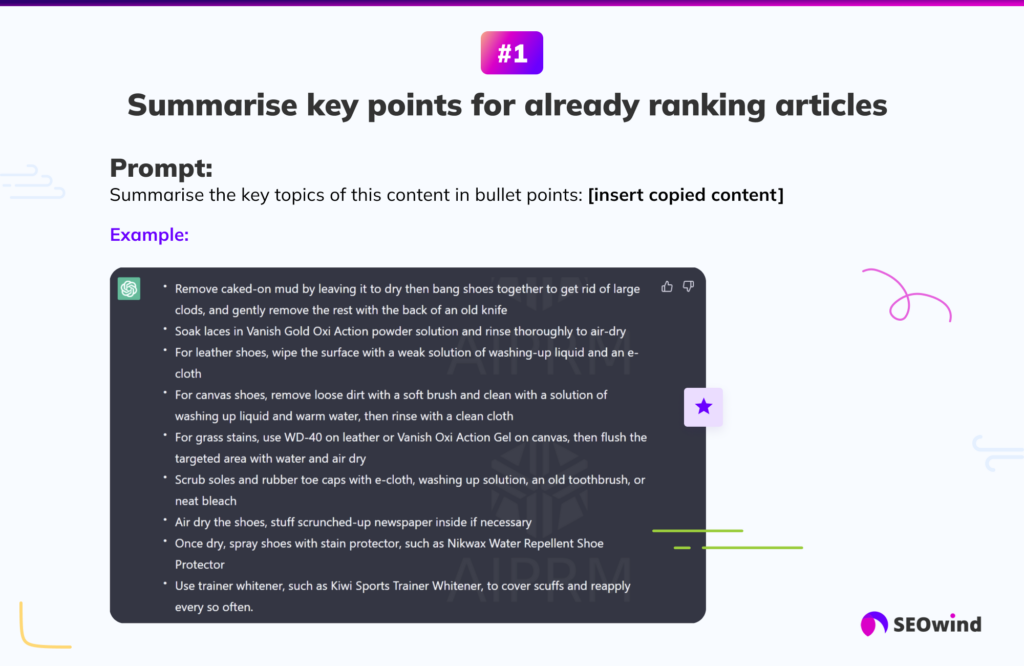
Afterward, I asked ChatGPT to combine the results for the content of the three SERPs I analyzed and merge them.
Final prompt
“Combine all of the key topics and summarize them in a final bullet-pointed list”
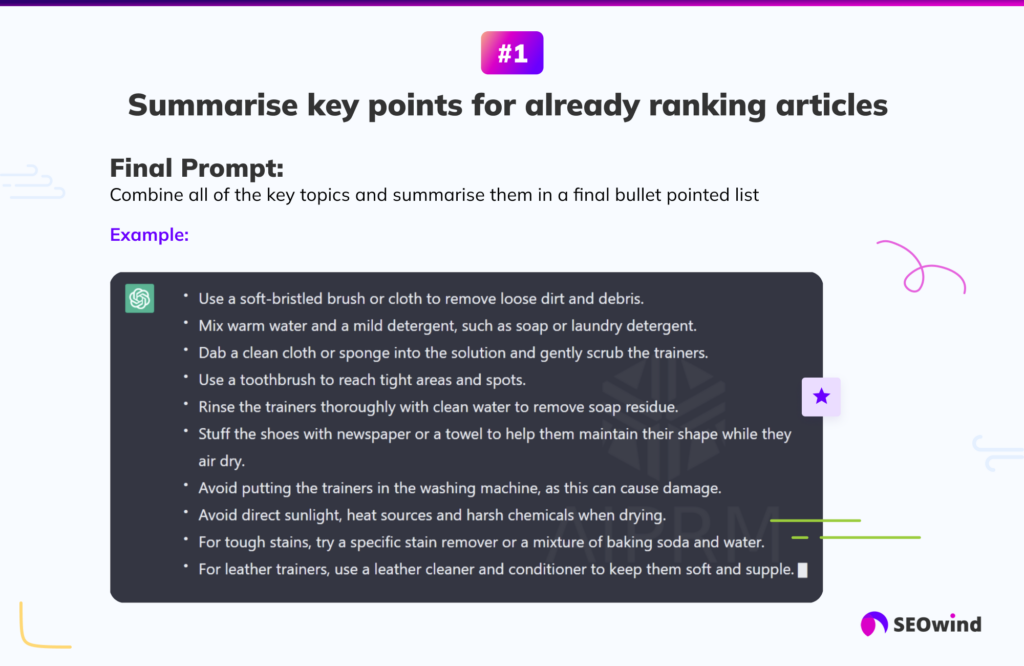
Limitations
In this case, ChatGPT provided some pretty good results. What it didn’t do so well is turn those results into a content brief by itself. This is the point at which a human should actually look at this from an intent perspective and structure the page not just for text, but for the content design itself.
So, if you wanted to get an idea of what kind of topics to cover, you could quite quickly copy all that content, put it into ChatGPT, and ask it to prepare a summary. This can serve as a really, really good foundation for what should be covered for that specific topic.
These findings can be added on top of an SEO content brief created by tools like SEOwind.
Other use cases
You can use the same approach to summarize articles and prepare a TLDR section to add it to the top of your page. By doing so, you can increase the page’s dwell time because many readers are likely already skimming through the whole article.
ChatGPT Prompt 2: Create regex code for Google Search Console
This prompt lets you find long tail keywords in Google Search Console (GSC). For those of you that use the service to look at your organic performance, you can utilize regular expression filters at the page level and at the query level, which will obviously give you a lot more options when it comes to how you can cut your data.
You can also modify the prompt to generate queries for GSC that include a certain word, at which point ChatGPT will generate a list of long-tail queries for you. Of course, you have a great deal of flexibility and could change this request to generate results of four words or more that include a certain word.
Prompt
Write a regular expression that filters queries in the search console with eight or more words
Outcome
ChatGPT came up with the following answer
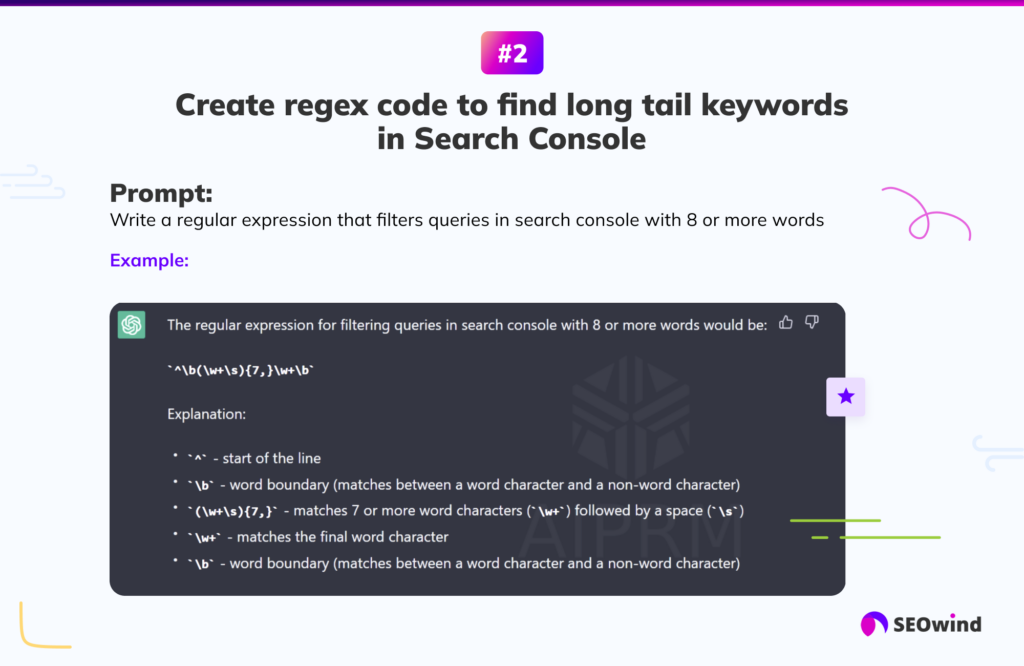
By using this prompt I managed to get the following keywords from Google Search Console:
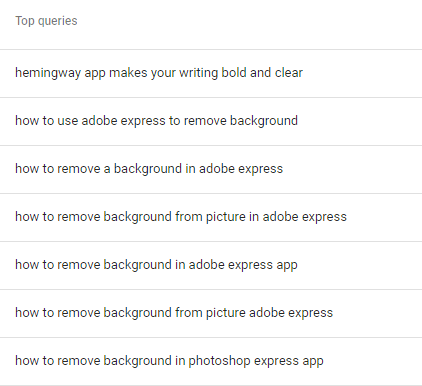
Comment
You can ask ChatGPT to elaborate even further about what the regex components mean. If you want, the tool can go through the list line by line and explain it to you exactly. You can learn quite a bit by implementing and using this type of language with ChatGPT as well.
ChatGPT Prompt 3: Clustering People Also Ask (PAA) Questions by semantic relevance
It can get tricky to cover user questions. You might collect relevant questions only to have the results end up cluttered. To avoid this, it really helps to cluster them. This essentially allows you to get a sense of what these questions are about and what intent users have when they’re asking them. In addition, you can determine how to put all these questions together to give a comprehensive answer.
Doing so can make it easier to make a decision on how many of those queries should be on one page and how many can be covered by a different topic cluster and other pillar pages.
Prompt
Cluster the following questions by topical semantic relevance: [insert PAA questions]
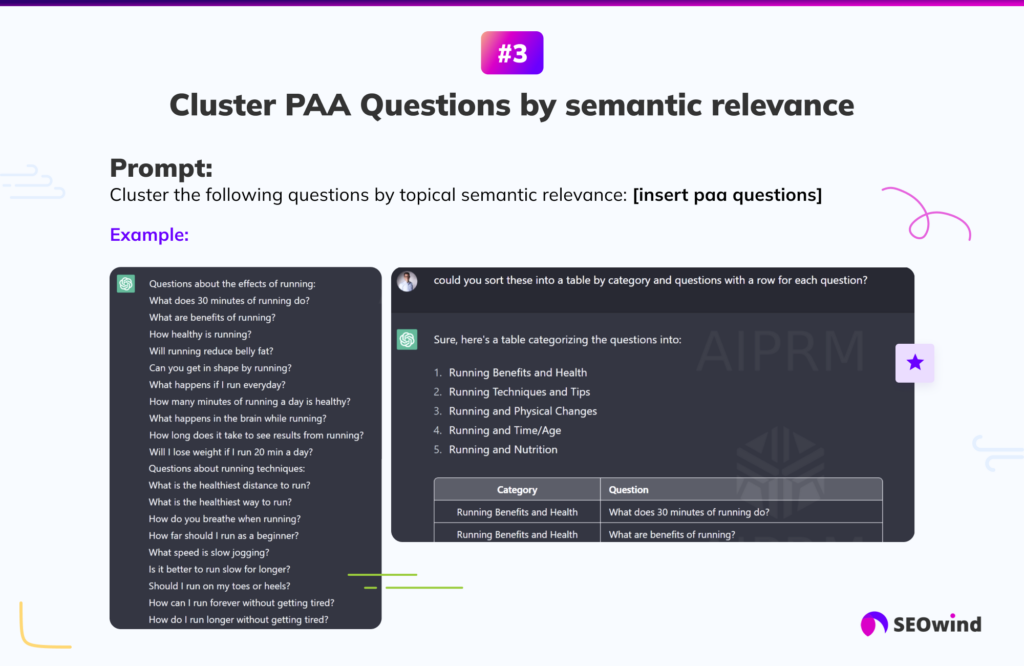
ChatGPT Prompt 4: Find related sites to a topic (up to 2021)
This prompt is slightly controversial. I would say it’s more aimed at inspiration and some relevance. I tested quite a few different variations of asking ChatGPT to give me examples of sites that cover a certain project or certain topic, and 80% of the time the tool actually works pretty well. Now, bearing in mind that ChatGPT only covers material published in 2021 or earlier, it has limited access to any new sites created later or content that’s been updated.
The prompt I used below has returned sites that are essentially a bit more than a year old. When I simply asked ChatGPT to give me 15 example websites on running, many of the results weren’t actually relevant to my interest. As soon as I used a more specific prompt about what I wanted it to do – I added that the examples should be related to running training and running form – you can see that most of the results actually directed me to websites that focus on running programs, running efficiency, and training plans.
Out of these 15, three of them don’t work because the sites don’t exist anymore. But of the 13 that do work, I’d probably use ten for inspiration in terms of overall topical coverage and some ideas for generating your own content cluster around running, training, and running form.
Prompt
Give me 15 example websites related to [keyword1] and [keyword2].
Outcome
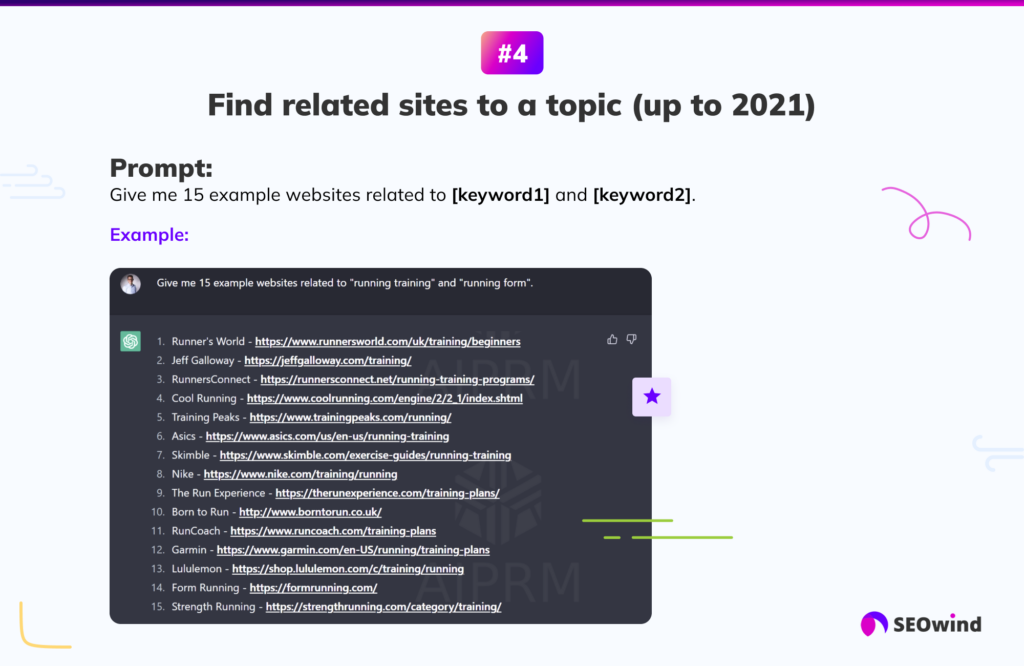
ChatGPT Prompt 5: Clustering keywords
ChatGPT can help a lot with keyword clustering. You can start with something, such as taking simple keywords from Semrush or ahrefs and asking ChatGPT to cluster them.
In my example, I took keywords related to, “vegetable gardens for beginners,” from Semrush and asked ChatGPT to cluster them. This kind of clustering made them far easier to work with.
Prompt
Use the following list of keywords and group them together to create content clusters: [list of keywords]
Outcome
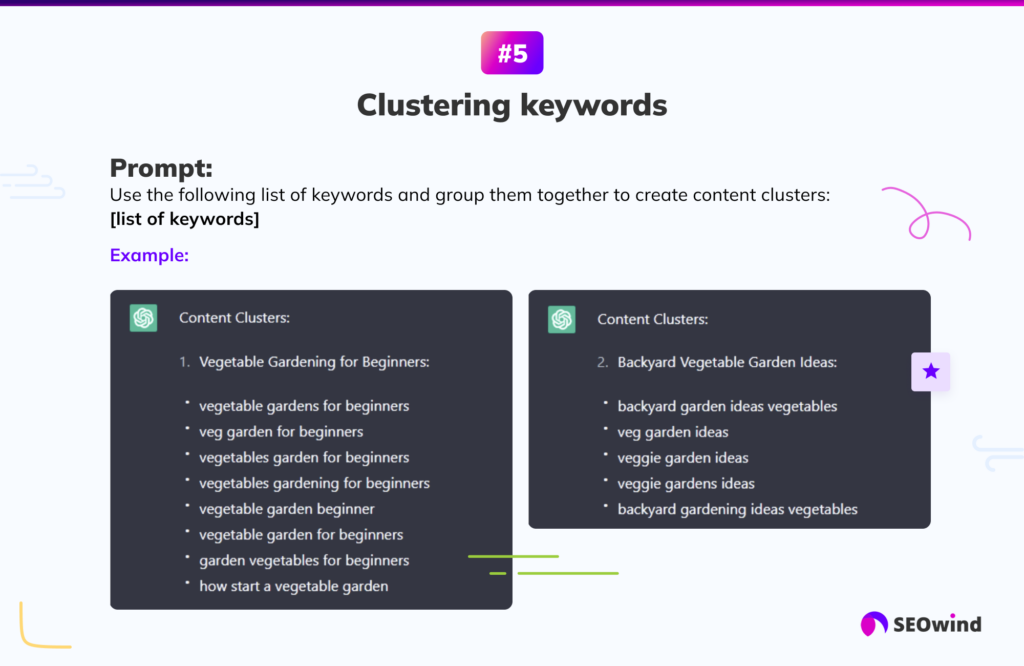
ChatGPT Prompt 6: Clustering keywords by search intent
Similar to the keyword clustering prompt, you can ask ChatGPT to classify keywords according to user intent. This is true whether it is informational, commercial, or navigational. There are tools on the market that do this more accurately. In terms of accessibility and cost, if you want to run a quick case study or proof of concept, these tools provide enough accuracy with regard to semantic clustering.
Prompt
Classify the following set of keywords on the basis of search intent in a table form (informational, commercial, and navigational): [list of keywords]
Outcome
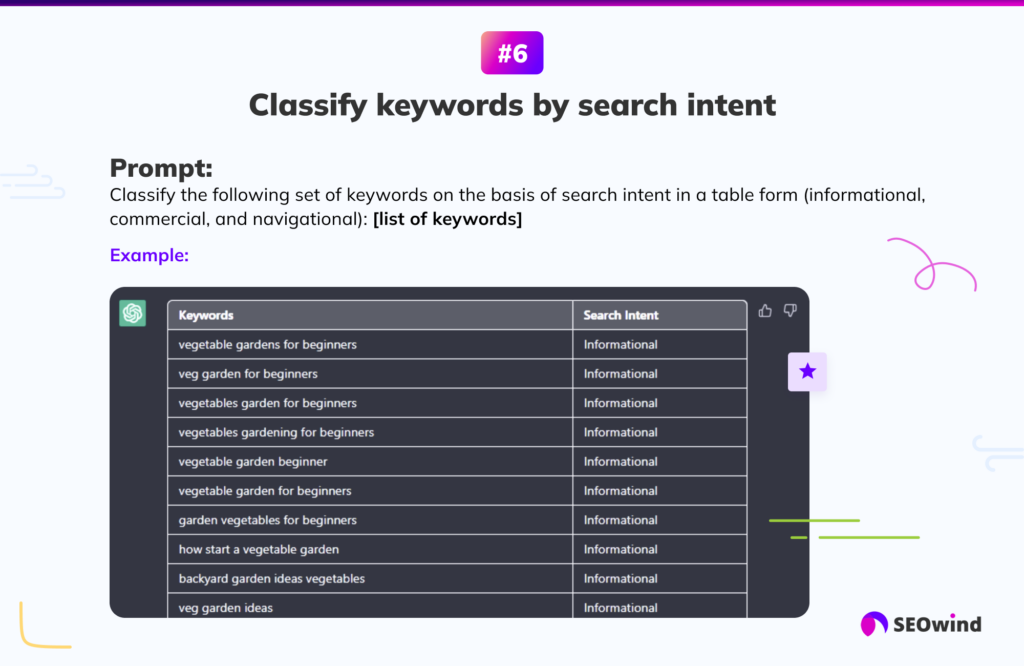
Comment
You might want to modify the prompt to provide a secondary intent column and the next closest intent for this query.
ChatGPT Prompt 7: Creating schema JSON code for FAQ (FAQ Markup Schema)
Prompt
Generate FAQ Schema markup code for the following set of Questions: [list of questions]
Note: You can take these questions from People Also Ask in Google, Quora, or Reddit and put them into ChatGPT, at which point the tool will generate schema markup for FAQ.
Outcome
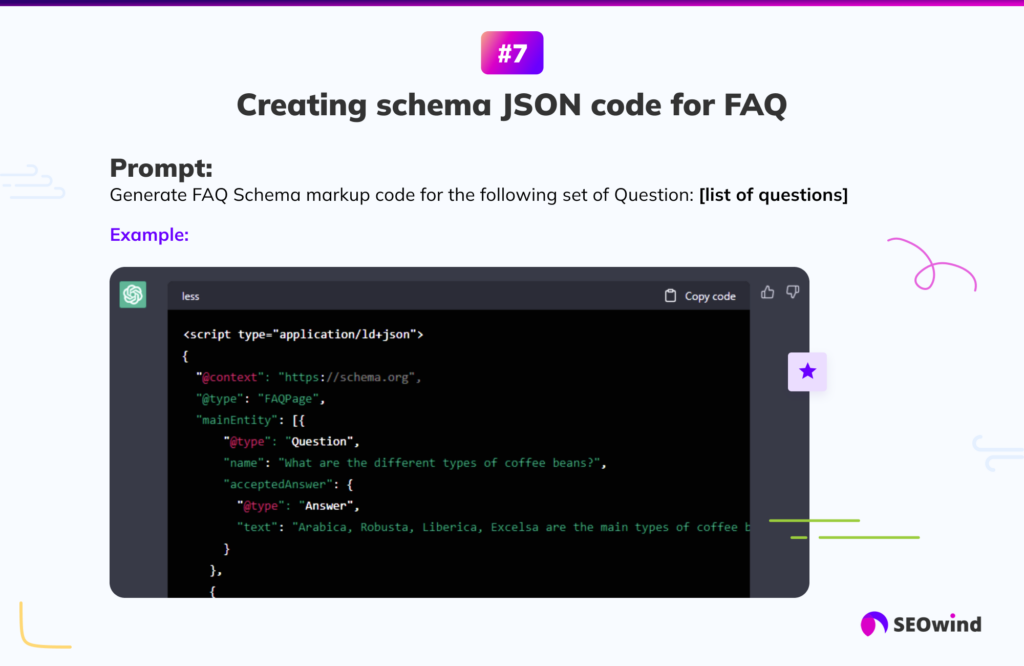
Comment
Always provide information about the questions you want to cover in your schema. ChatGPT doesn’t only add schema markup for these questions, but also provides the answers. So basically, you can copy and paste these answers directly into the article.
Note that I’m not telling ChatGPT to write a schema markup based on a specific page because I know that it will not scrape the data.
Instead, I provide all the information that I need here in ChatGPT, which is the basis for the schema markup. If you ask ChadGPT to develop an entity schema markup for a specific page, it will give you an answer, but it will not be based on the specified page. The result will actually be based on the slug. So from my perspective, it’s essential to provide all the information that ChatGPT needs to write the answer that I want.
ChatGPT Prompt 8: Writing a meta title
When writing a title, it is worth adding the specific keyword you want to rank for and asking ChatGPT to generate a couple of answers so that you have a choice. Keep in mind that it’s crucial to use objectives in the prompt so that you can define the tone of voice.
If you’re not a copywriter, ChatGPT can help establish the right tone and generate interest. From a data perspective, it increases CTRs, which helps content rank better. This happens because Google sees that more people are clicking.
While you provide ChatGPT with the keyword, remember that it’s a pretty creative tool. This means that it can go a bit off track and use a keyword that is similar but not identical to the one you indicated.
Prompt for meta title
Generate 5 interesting, and engaging titles of a maximum of 55 characters long each, for a web page on the following topic: [define topic]
Outcome
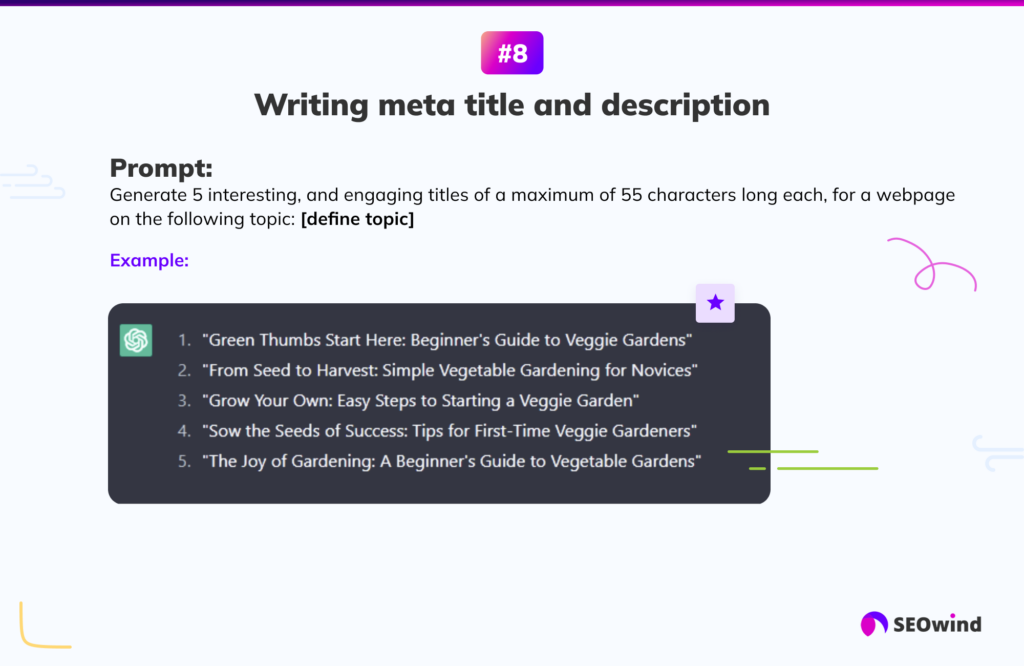
ChatGPT Prompt 9: Writing a meta description
It’s worth including the title to improve ChatGPT’s accuracy.
Prompt for the meta description
Generate 5 interesting, and engaging meta descriptions of a maximum of 155 characters each, for an article with the following title: [paste title]
Outcome
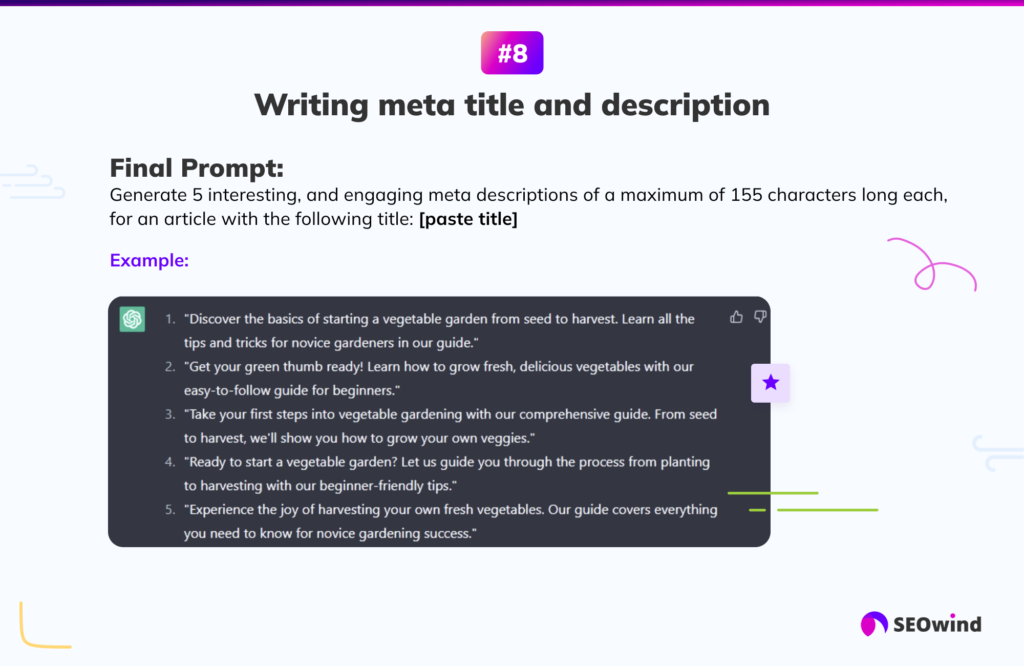
ChatGPT Prompt 10: Create Effective Introductions With AIDA (ChatGPT)
Here’s a prompt from Nick Zviadadze, Founder of MintSEO, for creating very effective introduction sections for your article:
Write an introduction to an article about the topic of “Article Title.” Follow the copywriting formula AIDA. Limit the introduction to less than 150 words.
Introduction sections are very important for SEO. Done right, they’ll grab the reader’s attention and get them to read the rest of your article. If done wrong, though, the reader will bounce and visit your competitor’s website instead. This formula for ChatGPT allows you to create effective introduction sections within minutes!
ChatGPT for SEO – practical tips
Tip 1: Think about what information you should feed into ChatGPT
One thing that everybody should consider is how to feed ChatGPT relevant information. It’s important to be as specific as possible.
Let’s return to our example of running and training websites. When I first asked it to identify and share websites on running, it came back with Nike and other sites that sell trainers as well as some other irrelevant results. But as soon as I became more specific about what I wanted it to do – identify websites focused on running training and running form – I received mostly relevant results that took me to sites that cover running programs, running efficiency, and training plans.
Tip 2: Test and experiment
Don’t quit if you initially get a low-quality response. Just test a different approach, change your prompt, and test the new input.
Tip 3: Bear in mind that ChatGPT is not good for fresh topics
Bear in mind that ChatGPT only covers material published in 2021 or earlier, so it lacks data related to current topics or new websites. As a result, the tool will struggle to provide relevant and up-to-date answers.
Tip 4: ChatGPT is not omniscient
Although it might seem otherwise, ChatGPT doesn’t know everything and is not always right. Double-check its answers, especially if they are related to facts, data, quotes, or statistics.
Tip 5: Ensure Your ChatGPT Prompt Stresses On Keywords
If you’re writing having SEO in mind, mind the keywords.
Alan Carr, Director of Webpop Design, shares one of his favorite prompts:
“Generate high-quality and keyword-rich content for [your target audience] on [topic]. The content should be at least 300 words and include [specific keywords or phrases].”
The structure of that prompt has several benefits:
- Targeted Content: By specifying your target audience and topic, you are ensuring that the generated content is relevant and of interest to your intended audience.
- Keyword-Rich: Including specific keywords or phrases in the prompt ensures that the generated content will contain those keywords, helping to improve your search engine ranking for those keywords.
- High-Quality: With a minimum length requirement of 300 words, you can be confident that the generated content will be substantial and of high quality.
- Time-Saving: Using ChatGPT to generate content saves you time and effort compared to researching, writing, and editing content yourself.
Tip 6: Act as a Customer, and Then An Expert
Joe Cowman, Head of SEO of FATJOE, gives a great example. Your client wants leads for commercial kitchen installation, but all you have to go on is a vague understanding of the service, the target market, and the related keywords. “Act as a restaurant owner. You’re looking for kitchen installation services. Create a list of questions you need answering and explain why these questions are important to you.” This prompt will help you understand what’s essential to the buyer and their decision-making. Then, you can ensure your service page provides the info they need and your content strategy is tailored to the right topics.
Afterward, you can reverse-engineer the prompt to help you get the information you need. “Now, act as a kitchen installation expert. You’re trying to sell your services to a restaurant owner. You need to answer their questions persuasively and in as much detail as possible. Here are the questions you need to answer: [insert questions from the previous prompt]”.
Tip 7: Explore prompt databases to sharpen your skills
To further enhance your SEO strategy, explore prompt databases to sharpen your skills and discover new ways to leverage ChatGPT effectively. These resources offer a wealth of ready-made prompts that can inspire fresh ideas and streamline your content creation process. Additionally, using AI-powered tools like Prompt Vibes AI can help you access specific prompts tailored to your needs, boosting the relevance and impact of your SEO efforts.
Webinar “Unlock the potential of ChatGPT to boost SEO results
ChatGPT packs quite the punch when used correctly. It can simplify and accelerate the creation of your SEO strategy and guide keyword selection. However, getting the most out of the tool requires knowing exactly how it works. You’ll also need to understand the best ways to interact with the solution.
In this webinar, Tom Winter, CGO at SEOwind, and Mersudin Forbes, SEO/Agency Advisor, discuss the strengths and weaknesses of ChatGPT and how it can strengthen your SEO strategy when applied effectively.
ChatGPT Prompts file pdf
Would you like to get the ChatGPT prompts for SEO from our webinar in one file? Just go to Unlock the potential of ChatGPT materials.
